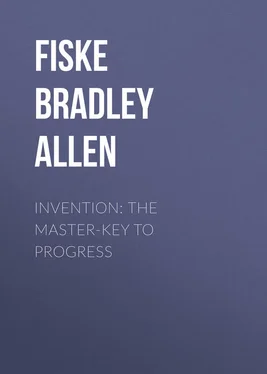Bradley Fiske - Invention - The Master-key to Progress
Здесь есть возможность читать онлайн «Bradley Fiske - Invention - The Master-key to Progress» — ознакомительный отрывок электронной книги совершенно бесплатно, а после прочтения отрывка купить полную версию. В некоторых случаях можно слушать аудио, скачать через торрент в формате fb2 и присутствует краткое содержание. Жанр: foreign_antique, foreign_prose, на английском языке. Описание произведения, (предисловие) а так же отзывы посетителей доступны на портале библиотеки ЛибКат.
- Название:Invention: The Master-key to Progress
- Автор:
- Жанр:
- Год:неизвестен
- ISBN:нет данных
- Рейтинг книги:4 / 5. Голосов: 1
-
Избранное:Добавить в избранное
- Отзывы:
-
Ваша оценка:
- 80
- 1
- 2
- 3
- 4
- 5
Invention: The Master-key to Progress: краткое содержание, описание и аннотация
Предлагаем к чтению аннотацию, описание, краткое содержание или предисловие (зависит от того, что написал сам автор книги «Invention: The Master-key to Progress»). Если вы не нашли необходимую информацию о книге — напишите в комментариях, мы постараемся отыскать её.
Invention: The Master-key to Progress — читать онлайн ознакомительный отрывок
Ниже представлен текст книги, разбитый по страницам. Система сохранения места последней прочитанной страницы, позволяет с удобством читать онлайн бесплатно книгу «Invention: The Master-key to Progress», без необходимости каждый раз заново искать на чём Вы остановились. Поставьте закладку, и сможете в любой момент перейти на страницу, на которой закончили чтение.
Интервал:
Закладка:
It can hardly be seriously questioned that in this plan Miltiades showed the abilities of the inventor, and in a highly brilliant and highly important way. Had he fought the battle in the obvious way, the great numerical superiority of the Persians could hardly have failed to gain the victory, despite a really considerable superiority of the Athenians in training and equipment. But the Persians were the victims of a new and unexpected kind of attack. A new weapon suddenly brought to bear on them would have had a similar effect.
This is the first illustration in recorded history of the influence of invention on the deciding of a war. Its influence was enormous in this case; for the battle of Marathon was one of the most decisive and one of the most important battles ever fought. If it had been decided contrariwise, Grecian civilization would have been stamped out, or so completely stifled that it would never have risen to the heights it afterwards attained; freedom of thought and government would have been smothered, and the world would be immeasurably different now from what it really is.
The defeat of the Persians was so decisive that they withdrew to their own country, but with the determination of returning, and in overwhelming force. By reason of a variety of circumstances, including the death of the king, the invasion did not take place until ten years later. Then, in the year 480 B. C., King Xerxes set out on a punitive expedition against Greece with an enormous military and naval force.
Again Greece was saved from Persia by pure brain power, that of Themistocles. Like Miltiades, he rejected the obvious. Discerning, as no one else discerned, that the weakest point in the Persian forces was the line of communication across the Ægean Sea, because the ships of those days were fragile, and an invading army needed to get supplies continually from Persia, he pointed out that although it was the Persian army that would do the actual damage in Greece, yet nevertheless, the major effort of the Athenians should not be spent on their army but on their navy.
The difficulties he met in making the Athenians see the truth may easily be imagined, from experiences in our own day. He succeeded at last, however; so that by the time the Persians reached Greece, Greece had a fleet that was very good, though not nearly so large as the Persian. The fleets came near to each other in the vicinity of Athens. The majority of the Athenian leaders advised that the Athenian fleet should retreat toward the south and west, to the isthmus of Corinth, and await the Persians there; because, if defeated, a safe retreat could be effected. But Themistocles opposed this plan with all the force and eloquence he could bring to bear; pointing out that the aim of the Athenians should not be to find a safe line of retreat, but to win a battle; and that the Bay of Salamis was the best place, for two reasons. One reason was that the Persians would have to enter the bay in column, because the entrance was narrow, and the Persian ships, as they successively passed into the bay, would therefore be at a great disadvantage against the combined attack of the Athenian ships, waiting for them there; the other reason was that the bay was so small that the great numbers and size of the Persian ships would be a disadvantage, instead of an advantage. Themistocles (not without the use of considerable diplomacy and even subterfuge) finally secured the assent of the other Athenian leaders. The result was exactly what he predicted that it would be. The Persian fleet was wholly defeated, and Greece again was saved.
The great victory of the Greeks over the Persians wrought a powerful stimulation among all the people, especially in Athens, and was followed by the most extraordinary intellectual movement in the history of the world. It lasted about a century and a half; and in no other country, and at no other period, has so much intellectual achievement been accomplished by so few people in so short a time.
Before the Persian wars, the Greeks had already shown an extraordinary originality in art and literature; especially in architecture, sculpture and poetry. Naturally these peaceful arts languished during the wars; but after the Persian invaders had been finally ejected, they rose with renewed vigor, stimulated by the patriotic enthusiasm of the nation as a whole.
It was in Athens, and among the Athenians that most of the movement was carried on. The principal state in Greece besides Athens then was Sparta. The Spartans devoted themselves mainly to warlike and allied arts, while the Athenians devoted themselves mainly to the beautification of Athens; though they were careful to guard it adequately by maintaining an excellent navy, surrounding the city with high walls, and building two long parallel walls from Athens to Piræus, its seaport.
It would be out of place in a book like this to attempt any description or discussion of the various phases of the intellectual activities that rose with such startling quickness, and developed into such important movements, during the century and a half that followed the Persian wars; especially as this has already been done by many scholars, in many languages, and at many times. A very brief and elementary statement may, however, be made, for the purpose of illustrating the influence of invention on history.
The main characteristic of the movement as a whole and of every one of the various channels which it followed, was originality. No such perception of beauty had ever been evidenced before; no such conceptions of logic, philosophy or science.
Accompanying these was a conception of free government equally original. Whether the government of Athens was the cause of the intellectual rise, or the intellectual rise was the cause of the government, may safely be left to scholars to debate; for the purposes of the present discussion, it seems sufficient that they co-existed and had together a powerful influence on history.
The greatest genius that guided the intellectual forces of the Athenians in the matter of government was that of Pericles, who ruled their minds by pure force of argument and persuasion, from about 445 to 431 B. C. Athens and her subject cities formed a virtual empire, small in extent, but powerful in influence; though in form it was a democracy. In some ways it was the most perfect democracy that ever has existed even to this day; for not only was every citizen available for office, but he was expected to take active part in deciding public measures, and to be really qualified to hold office.
This idea was put into practical operation by a careful system of payment for every public service; to the end that even the poorest citizen should be enabled to hold office, and a wealthy office-holding caste prevented from existing. To so great an extent was this carried out that, by the time that the Age of Pericles ceased and the Peloponnesian War began, almost every citizen was in the pay of the state. The perfect equality of all the citizens, and their community of interests and privileges, was recognized by supplying them at times with free tickets to places of amusement, and by banqueting the people on great occasions at the expense of the state. To distribute widely the powers and duties of citizenship, exceedingly large juries were established for the trials of all cases. There was no king or president or prime minister. The source of authority was the Assembly which included every citizen over eighteen years of age, and held forty meetings a year. Cooperating, as a sort of committee, was a Council of Five Hundred, whose members were chosen by lot each year from citizens over thirty years of age.
The success of the Athenian democracy has had a powerful influence ever since on history; because it has supplied not only a precedent but an encouragement to every people to try to escape from the individual restrictions that monarchies and all "strong governments" tend to impose. But it had another though less powerful influence also, which continued for a long while, but now has ceased, in supplying a precedent for slavery. For while the citizens of Athens were free, only the sons of Athenian fathers and Athenian mothers could be citizens; many thousand workers and merchants of all kinds could take no part in the government, and there were besides an enormous number of slaves. It was to a great degree the fact of slavery that made possible the success of the so-called Athenian democracy; for it liberated the citizens in very great measure from the drudgery of life, and gave them leisure to devote themselves to the study of government and the arts.
Читать дальшеИнтервал:
Закладка:
Похожие книги на «Invention: The Master-key to Progress»
Представляем Вашему вниманию похожие книги на «Invention: The Master-key to Progress» списком для выбора. Мы отобрали схожую по названию и смыслу литературу в надежде предоставить читателям больше вариантов отыскать новые, интересные, ещё непрочитанные произведения.
Обсуждение, отзывы о книге «Invention: The Master-key to Progress» и просто собственные мнения читателей. Оставьте ваши комментарии, напишите, что Вы думаете о произведении, его смысле или главных героях. Укажите что конкретно понравилось, а что нет, и почему Вы так считаете.












